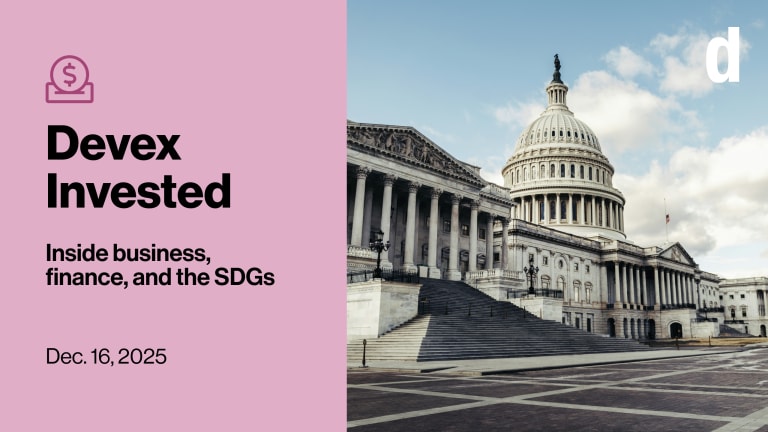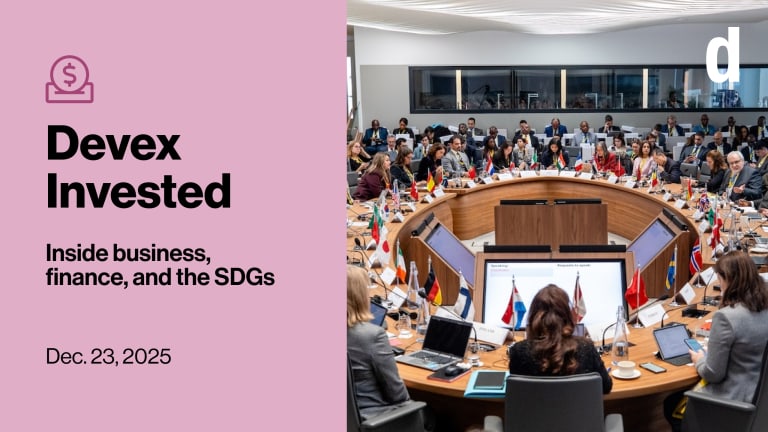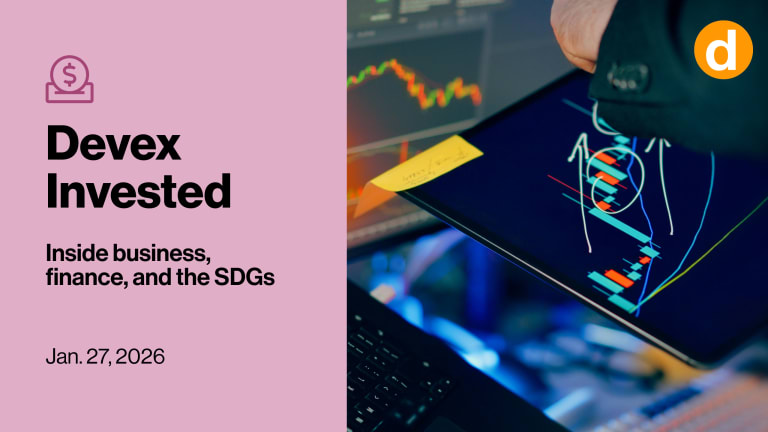
It’s not every day that a former president of the world’s biggest multilateral development bank is investigated for corruption and abuse of influence.
Werner Hoyer — who led the European Investment Bank between 2012 and 2023 — confirmed to the media through his legal team this week that he is one of two people under investigation by the European Public Prosecutor’s Office, calling the allegations “downright absurd and unfounded” and adding that he is fully cooperating with authorities and has asked EIB to do the same.
This is a preview of Devex Invested
Sign up to this weekly newsletter to get the insider brief on business, finance, and the SDGs in your inbox every Tuesday.
The 72-year-old German’s lawyer said the matter relates to a compensation payment to an EIB employee Hoyer signed off while president, following “a recommendation from the department in charge and the Secretary General of the EIB.”
The saga will have the development finance world riveted. And it is likely to overshadow another important piece of EIB news: The bank has finally appointed a permanent boss for its external lending arm, EIB Global. Andrew McDowell will start as director general in October, the bank tells us.
A former EIB vice president, McDowell is perhaps most known for stewarding the lender’s exit from fossil fuel financing, which was agreed in late 2019. Before that, he was an economic adviser to the Taoiseach — Ireland’s prime minister.
For the past three-and-a-half years McDowell has been at PwC as a partner in “Strategy&,” the firm’s strategy consulting business. And it’s that connection which has NGO coalition Counter Balance concerned already.
“Andrew McDowell's appointment as Director General of EIB Global has private profit written all over it, rather than development and global justice,” Counter Balance tells us. “Coming from the consultancy that helped companies in tax dodging, his new role raises concern over the ongoing shift towards bankrolling corporate interests with development money of the EU’s public bank.”
EIB Global signed €8.4 billion worth of financing in 2023 (out of the bank’s nearly €88 billion overall), and is a vital part of the European Union’s Global Gateway strategy to rival China’s Belt and Road initiative, including by helping EU companies invest abroad.
The appointment comes roughly one thousand days after the EIB board of directors gave the greenlight for the creation of a dedicated external branch back in September 2021. Hoyer appeared determined to find someone with political pedigree, but when his term ended at the end of last year, interim chief, Markus Berndt, was still at the helm.
Now the new EIB president, Nadia Calviño, has tapped McDowell, who must show (notably the European Commission) that EIB is ready to take on more risky, high-impact projects. It’s a fine balance, especially with the political imperative to maintain support for Ukraine. As Berndt told me in an interview in September 2021, “the crucial point, and rightly so, for the finance ministers that represent the member states in this bank, is, of course, to make sure that whatever we do outside the EU is not causing problems for what we do inside the EU.”
From our archives: A Q&A with Markus Berndt on EIB’s new development branch
Helping ONE heal
Keeping with the theme of changing personnel, we’ve got a long read on the new head of the development advocacy organization ONE, Ndidi Okonkwo Nwuneli.
The 49-year-old Nigerian-born entrepreneur is the group’s first African leader. As Devex’s Elissa Miolene reports, Nwuneli is a former consultant, business leader, and agriculture expert, and she now finds herself at the helm of a 110-person organization at a tumultuous time.
Irish rockstar Bono, who co-founded ONE in 2004, announced in April 2023 that he’d be leaving the organization’s board. Gayle Smith, ONE’s longest-serving CEO, stepped down soon afterward, and Tom Hart, ONE’s president, did the same. ONE then cut some 30% of its staff, citing financial difficulties and a “competitive fundraising landscape.”
“We’re healing as an organization,” Nwuneli tells Elissa. “But what is galvanizing us is our vision for the future, what ONE can deliver, and the impact it can have.”
Read: ONE enters its next chapter with first African CEO at the helm (Pro)
+ If you’ve been considering signing up for Devex Pro, now is your chance! For a limited time we’re offering $100 off on an annual Devex Pro membership. Sign up today to access exclusive events, insider articles, in-depth reports, and much more for a full year.
What’s next for DFC?
We’ve been writing plenty about the U.S. International Development Finance Corporation of late: from warnings from Republicans not to pursue a “woke agenda” to ideas on how to make it faster and more impactful.
Now you can go deeper with our exclusive interview with DFC CEO Scott Nathan tomorrow at 1 p.m. ET (7 p.m. CET).
With insufficient global funding and escalating development challenges, collaboration among development finance institutions is more critical than ever. Devex President and Editor-in-Chief Raj Kumar will ask Nathan how he plans to go about it. Plus, Devex Senior Reporter Adva Saldinger will interview former U.S. Rep. Ted Yoho and Rep. Andy Kim, formerly of USAID, the Pentagon, and State Department, who now sits on the House Foreign Affairs Committee, overseeing DFC.
Sign up for the event now. If you won’t be able to attend live, register anyway and a recording will be sent to you.
Hit the accelerator
The COVID-19 pandemic, and the extreme vaccine inequality that went with it, prompted a spate of donor efforts to improve vaccine manufacturing on the African continent. It hasn’t always been smooth sailing though, as evidenced by Moderna’s decision to abandon plans to build a facility in Kenya earlier this year.
Last week saw Gavi, the Vaccine Alliance launch its $9 billion replenishment target at a summit in Paris.
At the same time, France, the European Union, and the African Union, through the Africa Centres for Disease Control and Prevention, launched the African Vaccine Manufacturing Accelerator — aiming to invest at least $1 billion over the next 10 years.
“It does this by paying manufacturers that have received prequalification for priority vaccines an initial lump sum payment, followed by time-limited ‘accelerator payments,’” the French development minister and the heads of Africa CDC and Gavi write in an opinion piece for Devex.
Read: Gavi launches $9B replenishment target
Opinion: Here’s what today’s African vaccine accelerator launch means
What we’re reading
If Donald Trump wins the U.S. presidential election in November, his supporters have a plan to “rightsize” the country’s foreign aid budget. [Devex Pro]
How once-thriving Ghana was forced to seek a bailout. [Bloomberg]
From Nobel Peace Prize to civil war: How Ethiopia’s leader beguiled the world. [The Guardian]








